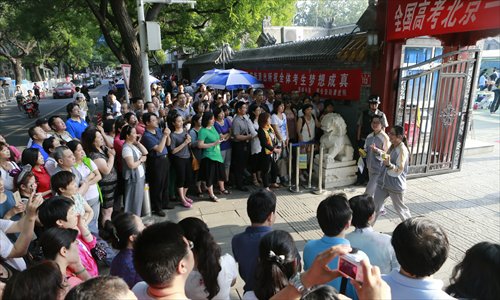
Students exit one of the test sites after finishing the gaokao in Beijing on June 8. More and more foreign universities are accepting gaokao scores for Chinese student enrollment. (Photo: Li Hao/GT)
Chen Yin, an 18-year-old girl from Beijing, was a bit disappointed last year when the national college entrance examination or gaokao scores were announced. Despite scoring 40 points higher than the enrollment threshold for top universities, Chen still didn't get into her first choice: a top university in Beijing.
She was mentally preparing to attend her second choice, a university in Chongqing, when she heard that the University of San Francisco (USF) had a gaokao-based early admission program for Chinese students, like her, who scored above the enrollment threshold. Chen immediately applied, and one week after the interview, she got an offer. The rest was history.
Now, after almost a year majoring in biology at USF, Chen has adapted well to her new life and is very happy with her choice.
"I did not have to go to a not very good domestic university," said Chen. "It also saved me quite a lot of time preparing for SAT (Scholastic Aptitude Test, a test used for admission into American universities) and TOEFL (Test of English as a Foreign Language)."
The gaokao scores in Beijing, and many other provinces, were announced recently. While some students are busy prepping to apply for the university of their choice, others are left with their second best.
In China's highly competitive market, sometimes even above average scores fail to get the desired results. Now, instead of being shunted to universities they don't want to attend, students have the option of attending universities abroad, thanks to the jump in the number of universities willing to accept gaokao scores. Currently, several universities in the US, Italy, Germany, and around 30 universities in Australia recognize gaokao scores, and the number is still growing.
Among the foreign countries, Australia is the first to recognize gaokao scores, according to the People's Daily in 2015.
A consultant surnamed Zhu at the Australia International Student Management Center China Office told Metropolitan that since the University of Sydney recognized gaokao in 2012, they have seen a growing number of Australian universities follow suit. So far, around 30 universities in Australia accept gaokao.
"These universities told us that they find that many of the gaokao students perform well, which encourages them to continue enrolling based on this criteria this year," said Zhu.
She said she has been receiving many inquires about the requirements and application process recently.
This year is USF's second year of accepting gaokao scores for university admission. The school is the second university in the U.S., after the Illinois Institute of Technology, to introduce a gaokao-based early admission program.
Stanley D. Nel, vice president of international relations at USF with responsibility for China admissions, said the school drew from Australia's evaluation process to create USF's gaokao admission program.
But he said that besides accepting gaokao scores, they also try interview process instead of requiring IELTS (International English Language Testing System) scores, which is required by Australian universities.
"It is simply not possible to do well in an open-ended, one-on-one, face-to-face interview with an English professor unless one actually has good English proficiency. Students' gaokao scores and in-person interview performance help examiners evaluate their abilities," said Nel.
He said that last year, when the program was pilot, they interviewed 74 students out of more than 200 applicants and enrolled 20. Only those whose scores are above the cut-off line for first-tier universities have a chance at getting an interview.
"Gaokao has the advantage of being what educational experts call a 'criterion-referenced' exam; it tests not only intellectual ability but also whether students are able to work hard and consistently to master a large body of knowledge over an extended period," said Nel. "In this way, it is similar to the International Baccalaureate Diploma (a program that was formulated in Switzerland and is recognized worldwide for its rigor and innovation), although there are differences."
He said multiple studies have shown that SAT scores have not much predictive value in helping evaluators decide who will do well at the university level. The SAT tests only mathematics, reading, and writing, and some reasoning ability. It does not test specific knowledge of subject matter, such as history or physics or whatever else the student has studied, Nel said.
"The students exceeded our expectations. They adapted quickly and well to life at USF," said Nel of the first batch of enrollees.
He said they have a combined grade point average (GPA) of 3.5 out of a possible 4.0, and eight of them had GPAs above 3.8. American freshmen at USF had an average of 3.2, and other international freshmen, including Chinese students who did not come through the gaokao program, had an average of below 3.0.


















































